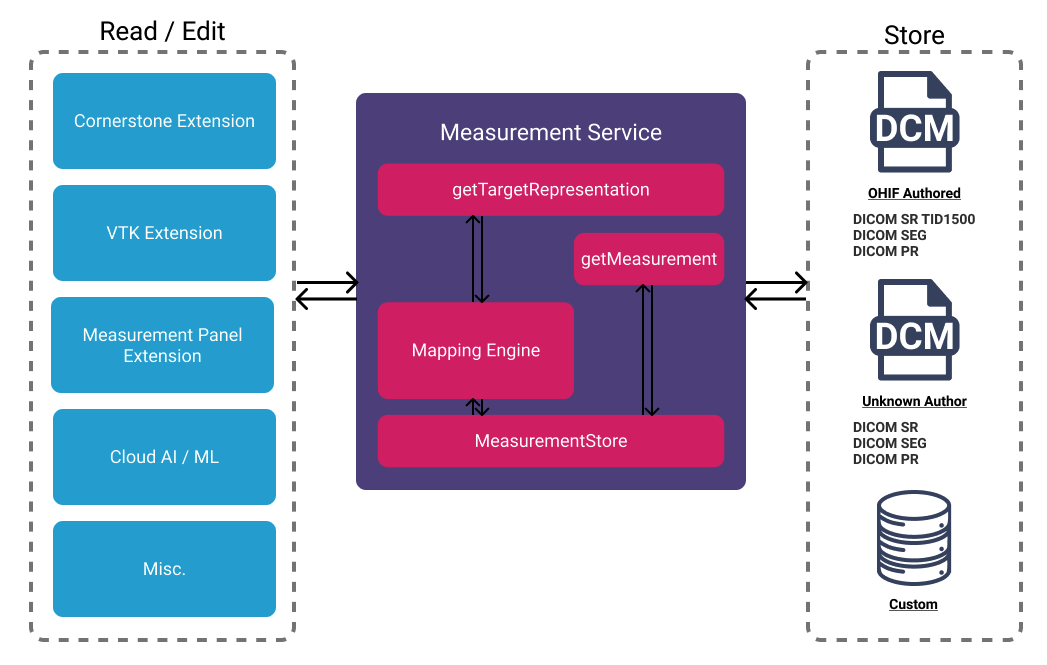Measurement Service
Overview
MeasurementService handles the internal measurement representation inside
OHIF platform. Developers can add their custom sources with mappers to
enable adding measurements inside OHIF. Currently, we are maintaining
CornerstoneTools annotations and corresponding mappers can be found inside the
cornerstone extension. However, MeasurementService can be configured to work
with any custom tools given that its mappers is added to the
MeasurementService. We can see the overall architecture of the
MeasurementService below:

Events
There are seven events that get publish in MeasurementService:
| Event | Description |
|---|---|
| MEASUREMENT_UPDATED | Fires when a measurement is updated |
| MEASUREMENT_ADDED | Fires when a new measurement is added |
| RAW_MEASUREMENT_ADDED | Fires when a raw measurement is added (e.g., dicom-sr) |
| MEASUREMENT_REMOVED | Fires when a measurement is removed |
| MEASUREMENTS_CLEARED | Fires when all measurements are deleted |
| JUMP_TO_MEASUREMENT_VIEWPORT | Fires when a measurement is requested to be jumped to, applying to individual viewports. |
| JUMP_TO_MEASUREMENT_LAYOUT | Fires when a measurement is requested to be jumped to, applying to the overall layout. |
API
getMeasurements: returns array of measurementsgetMeasurement(id): returns the corresponding measurement based on the provided Id.remove(id, source): removes a measurement and broadcasts theMEASUREMENT_REMOVEDevent.clearMeasurements: removes all measurements and broadcastsMEASUREMENTS_CLEAREDevent.createSource(name, version): creates a new measurement source, generates a uid and adds it to thesourcesproperty of the service.addMapping(source, definition, matchingCriteria, toSourceSchema, toMeasurementSchema): adds a new measurement matching criteria along with mapping functions. We will learn more about source/mappers belowupdate: updates the measurement details and firesMEASUREMENT_UPDATEDaddRawMeasurement(source,definition,data,toMeasurementSchema,dataSource = {}: adds a raw measurement into a source so that it may be converted to/from annotation in the same way. E.g. import serialized data of the same form as the measurement source. FiresMEASUREMENT_UPDATEDorMEASUREMENT_ADDED. Note that,MeasurementServicehandles finding the correct mapper upon new measurements; however,addRawMeasurementprovides more flexibility. You can take a look into its usage indicom-srextension.source: The measurement source instance.definition: The source definition you want to add the measurement to.data: The data you wish to add to the source.toMeasurementSchema: A function to get thedatainto the same shape as the source definition.
jumpToMeasurement(viewportIndex, id): calls the listeners who have subscribed toJUMP_TO_MEASUREMENT.
Source / Mappers
To create a custom measurement source and relevant mappers for each tool, you
can take a look at the init.js inside the cornerstone extension. In which we
are registering our CornerstoneTools-v4 measurement source to
MeasurementService. Let's take a peek at the simplified implementation
together. To achieve this, for each tool, we need to provide three mappers:
matchingCriteria: criteria used for finding the correct mapper for the drawn tool.toAnnotation: tbdtoMeasurement: a function that converts the tool data to OHIF internal representation of measurement data.
function toMeasurement(
csToolsAnnotation,
DisplaySetService,
getValueTypeFromToolType
) {
const { element, measurementData } = csToolsAnnotation;
/** ... **/
const {
SOPInstanceUID,
FrameOfReferenceUID,
SeriesInstanceUID,
StudyInstanceUID,
} = getSOPInstanceAttributes(element);
const displaySet = DisplaySetService.getDisplaySetForSOPInstanceUID(
SOPInstanceUID,
SeriesInstanceUID
);
/** ... **/
return {
id: measurementData.id,
SOPInstanceUID,
FrameOfReferenceUID,
referenceSeriesUID: SeriesInstanceUID,
referenceStudyUID: StudyInstanceUID,
displaySetInstanceUID: displaySet.displaySetInstanceUID,
label: measurementData.label,
description: measurementData.description,
unit: measurementData.unit,
length: measurementData.length,
type: getValueTypeFromToolType(tool),
points: getPointsFromHandles(measurementData.handles),
};
}
//////////////////////////////////////////
// extensions/cornerstone/src/init.js
const Length = {
toAnnotation,
toMeasurement,
matchingCriteria: [
{
valueType: MeasurementService.VALUE_TYPES.POLYLINE,
points: 2,
},
],
};
const _initMeasurementService = (MeasurementService, DisplaySetService) => {
/** ... **/
const csToolsVer4MeasurementSource = MeasurementService.createSource(
'CornerstoneTools',
'4'
);
/* Mappings */
MeasurementService.addMapping(
csToolsVer4MeasurementSource,
'Length',
Length.matchingCriteria,
toAnnotation,
toMeasurement
);
/** Other tools **/
return csToolsVer4MeasurementSource;
};